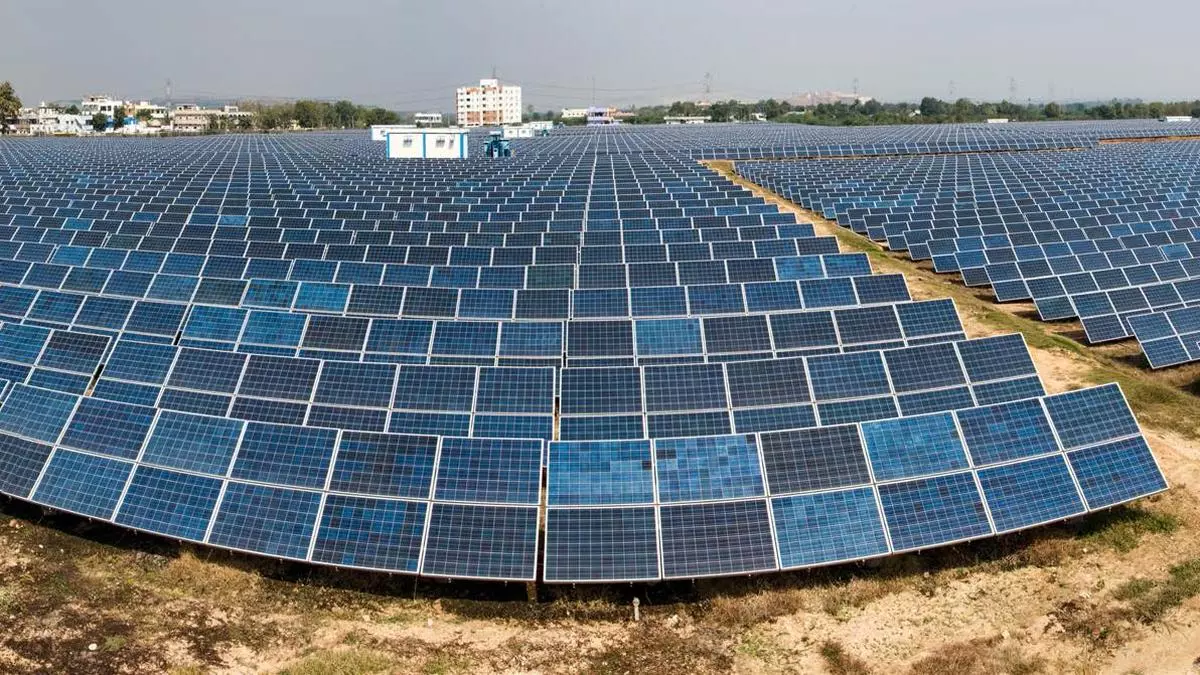 |
|
NTPC Green Energy Limited (NGEL), a subsidiary of the National Thermal Power Corporation (NTPC), has launched its much-anticipated initial public offering (IPO). The IPO aims to raise ₹10,000 crore, with ₹7,500 crore earmarked for debt repayment and the remaining for general corporate purposes. This move reflects NGEL's significant expansion in the renewable energy sector, leveraging its parent company's strong financial standing and established market presence. NGEL's impressive growth trajectory, fueled by both organic and inorganic strategies, positions it as a key player in India's burgeoning renewable energy landscape. The company currently holds the title of India's largest renewable energy public sector undertaking (PSU) based on operational capacity as of September 2024, a testament to its rapid expansion and efficient project execution.
However, the IPO's valuation presents a considerable challenge for prospective investors. At the upper end of the price band, NGEL is valued at a high 47.5 times EV/Revenue (trailing twelve months ending September 2024) and 259 times PE (TTM), significantly exceeding industry benchmarks. This high valuation, further compounded by an 11 times Price-to-Book ratio (pre-IPO), raises concerns about potential overvaluation. Comparative analysis with industry competitors such as Adani Green Energy and ACME Solar reveals that NGEL's valuation significantly surpasses their respective metrics. While the strong parentage and management team's track record justify a premium, the current valuation demands careful consideration. The high valuation is a significant risk factor for investors, potentially limiting returns and increasing the overall investment risk profile.
Despite the high valuation, the renewable energy sector itself exhibits considerable growth potential. Government policies favoring renewable energy sources and strong demand for power create a favorable environment for companies like NGEL. The company's focus on solar and wind energy projects, along with its exploration of green hydrogen technology, positions it well to capitalize on this trend. NGEL benefits from long-term power purchase agreements (PPAs), securing revenue visibility and mitigating certain risks. Its predominantly government-backed off-taker base minimizes counterparty risk, ensuring relative stability in revenue streams. However, the concentration of revenue from a single off-taker (approximately 50% in FY24 and H1 FY25) presents a potential vulnerability, warranting close monitoring of revenue diversification strategies. The implementation of the LSP Rules, 2022 has positively impacted the company's working capital management, improving the collection of receivables.
NGEL's operational performance shows promising growth, with revenue and EBITDA increasing significantly in FY24. However, profit after tax (PAT) decreased due to higher finance and depreciation costs. While the CAGR for revenue, operating EBITDA, and PAT demonstrates robust growth (47%, 48%, and 91% respectively during FY22-24), investors should carefully analyze the sustainability of this growth considering the increase in expenses. The capacity utilization factor, while comparable to competitors, suggests potential for further optimization. The company's focus on solar energy, especially in regions with high solar irradiation like Rajasthan and Gujarat, provides a strategic advantage, although the lack of substantial commitment to firm and dispatchable renewable energy (FDRE) projects, despite growing demand, raises questions about the company’s long-term strategic positioning. Their rationale of current tariff levels for FDRE not accounting for sufficient redundancies needs closer scrutiny. The decision to pursue JVs and SPVs with off-takers to mitigate cost overruns and potentially create cost-plus-like projects is a noteworthy strategy that enhances profitability.
NGEL’s ambitious target of reaching 60 GW of non-fossil capacity by FY32 underscores its commitment to expansion, which should be viewed within the context of the overall industry outlook. Its foray into green hydrogen production, through the development of a green hydrogen hub in Andhra Pradesh, represents a strategic move into a rapidly emerging sector, and partnerships with electrolyzer technology providers enhance its prospects in this field. The strong operational cash flow and reasonable net debt-to-equity ratio also provide a degree of financial stability. However, the high valuation remains the most significant factor influencing investment decisions. The allocation of 278 crore equity shares to NTPC at ₹10 per share, resulting in a substantial gain at the upper end of the issue price, underscores the potential for significant returns, but this should not overshadow the intrinsic risk associated with the high valuation. Overall, while NGEL holds strong potential within the growth trajectory of the renewable energy sector, investors should exercise caution and possibly adopt a 'wait-and-see' approach given the current high valuation.
In conclusion, the NTPC Green Energy IPO presents a compelling opportunity within a rapidly growing sector. The company’s strong parentage, robust growth trajectory, and strategic focus in renewable energy are promising aspects. However, the significantly high valuation relative to peers and the relatively high debt levels necessitates thorough due diligence and a careful assessment of risk tolerance before committing to an investment. The high concentration of revenue from a single off-taker, although mitigated somewhat by recent regulatory changes, remains a factor for concern. Prospective investors need to weigh the potential for high returns against the significant risk of overvaluation before making an informed decision.
